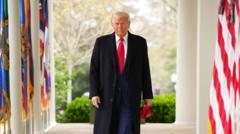President Trump's aggressive tariff strategy leads to global economic uncertainty as countries react in varied ways.
**Trump's High-Stakes Tariff Gamble: Global Economy on Edge**

**Trump's High-Stakes Tariff Gamble: Global Economy on Edge**
Ahead of a pivotal tariff decision, world leaders scramble to navigate Trump's unpredictable trade policy.
As the deadline for Donald Trump's controversial "reciprocal" tariffs looms, tension mounts in the global economy. With a wave of nations designated as "worst offenders" urgently courting favor with the White House, the potential ramifications of this high-stakes gamble are profound. In stark contrast, China maintains its defiant stance, opting for a strategy of retaliation.
Despite some unease expressed by congressional allies and financial markets, Trump seems undeterred. His recent exchange, where he dismissively labeled a question about acceptable market losses as "stupid," raises further questions about his true intentions. Are these tariffs merely tools for negotiation, or does the president aim for a deeper, permanent shift in global economic dynamics based on perceived fairness in trade?
On Monday, Israeli Prime Minister Benjamin Netanyahu sought to align with Trump's demands by pledging to reduce trade barriers and eliminate the trade surplus with the U.S. His remarks implied that Israel might serve as a model for other nations looking to escape the impending tariff storm. Japan's Prime Minister also stepped in, indicating a willingness to negotiate with the U.S. as both countries aim for collaborative trade relations.
In a more aggressive stance, China responded to Trump's 34% tariff increase with a matching response, escalating tensions further. Trump's threats of additional 50% tariffs reflect a willingness to escalate the situation if China does not yield by the stipulated deadline. The ongoing back-and-forth between the two powerhouses is causing concern among investors, who recently witnessed significant fluctuations in the stock market due to these developments.
An increasing number of voices from the business sector, including those who previously supported Trump's administration, are now questioning the wisdom behind this tariff approach, emphasizing the potential economic fallout of such a conflict. As uncertainty reigns, even a hint of potential tariff delays sent markets briefly soaring, only for reality to set in upon the White House's quick denial of any delay considerations by the president.
Compounding the anxiety surrounding Trump's tariff initiatives is the perspective adopted by his adviser Peter Navarro, who emphasizes that negotiations with world leaders may not yield the intended results. The underlying motives of Trump's aggressive stance remain debatable; some theorize a strategic intent to alter the dynamics of currency value and export accessibility, although this has not been acknowledged as official policy.
As Trump barrels toward this critical juncture with his tariffs, he has left the world guessing about his next moves and the broader implications for the global economy. The ripple effects of this gamble could be significant, warning that the stakes are high not just for America, but for economies worldwide.





















